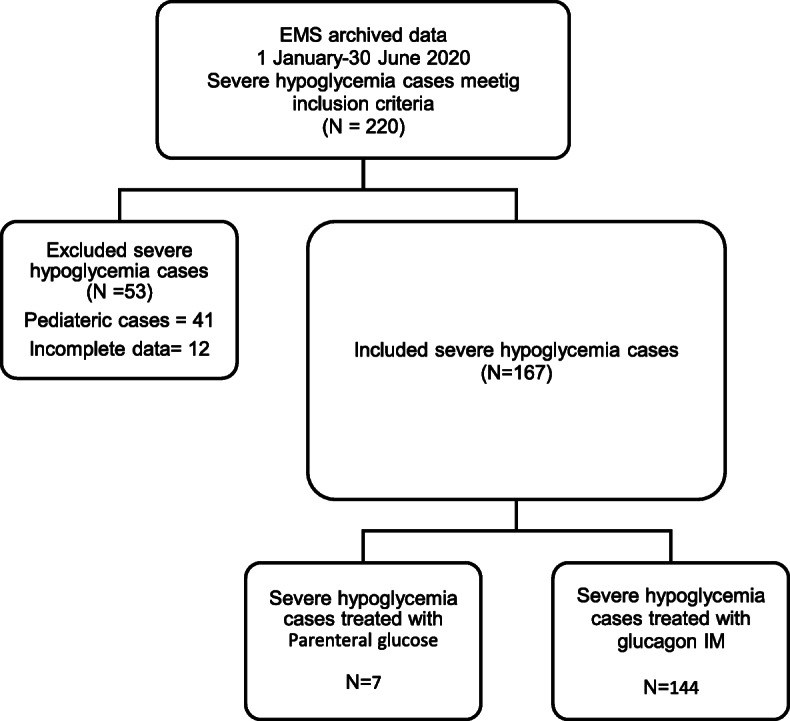Epidemiology and outcomes from severe hypoglycemia in Kuwait: a prospective cohort study
Affiliations
Affiliations
- 1Department of Applied Medical Sciences, College of Health Sciences, Public Authority of Applied Education and training, State of Kuwait, Kuwait City, Kuwait. dm.alhasan@paaet.edu.kw.
- 2Audit Department, Emergency Medicals Services, State of Kuwait, Kuwait City, Kuwait.
- 3Emergency Medicine Department, University of Cape Town, Cape Town, South Africa.
Abstract
Background: The objective of this study was to describe the epidemiology of severe hypoglycaemia in Kuwait, aiming to provide a preliminary background to update the current guidelines and improve patient management.
Method: This was a prospective analysis of severe hypoglycaemia cases retrieved from emergency medical services (EMS) archived data between 1 January and 30 June 2020. The severe hypoglycaemia cases were then sub-grouped based on EMS personal initial management and compared in terms of scene time, transportation rate, complications and outcomes. The primary outcomes were GCS within 10-30 min and normal random blood glucose (RBS) within 10-30 min.
Results: A total of 167 cases met the inclusion criteria. The incidence of severe hypoglycaemia in the national EMS was 11 per 100,000. Intramuscular glucagon was used on scene in 89% of the hypoglycaemic events. Most of the severe hypoglycaemia patients regained normal GCS on scene (76.5%). When we compared the two scene management strategies for severe hypoglycaemia cases, parenteral glucose administration prolonged the on-scene time (P = .002) but was associated with more favourable scene outcomes than intramuscular glucagon, with normal GCS within 10-30 min (P = .05) and normal RBS within 10-30 min (P = .006).
Conclusion: Severe hypoglycaemia is not uncommon during EMS calls. Appropriate management by EMS personals is fruitful, resulting in favourable scene outcomes and reducing the hospital transportation rate. More research should be invested in improving and structuring the prehospital management of severe hypoglycaemia. One goal is to clarify the superiority of parenteral glucose over intramuscular glucagon in the prehospital setting.
Keywords: Emergency medical services; Glasgow coma scale; Kuwait; Random blood sugar; Severe hypoglycemia.
Conflict of interest statement
The authors declare that they have no competing interests.
Figures
Similar articles
Vihonen H, Kuisma M, Nurmi J.Scand J Trauma Resusc Emerg Med. 2018 Feb 1;26(1):12. doi: 10.1186/s13049-018-0480-7.PMID: 29391050 Free PMC article.
O'Connor L, Kue RC, O'Connor MJ.Prehosp Emerg Care. 2019 Nov-Dec;23(6):780-787. doi: 10.1080/10903127.2019.1587125. Epub 2019 Mar 28.PMID: 30893563
Villani M, Earnest A, Smith K, Giannopoulos D, Soldatos G, de Courten B, Zoungas S.Diabetologia. 2019 Oct;62(10):1868-1879. doi: 10.1007/s00125-019-4933-y. Epub 2019 Jul 15.PMID: 31309262
Hypoglycaemia in children with type 1 diabetes mellitus.
Chiarelli F, Verrotti A, Catino M, Sabatino G, Pinelli L.Acta Paediatr Suppl. 1999 Jan;88(427):31-4. doi: 10.1111/j.1651-2227.1999.tb14337.x.PMID: 10195851 Review.
Iqbal A, Heller S.Best Pract Res Clin Endocrinol Metab. 2016 Jun;30(3):413-30. doi: 10.1016/j.beem.2016.06.004. Epub 2016 Jun 14.PMID: 27432075 Review.
KMEL References
References
-
- International diabetes federation . International diabetes federation. 2020. IDF MENA members.
-
- Diabetes.co.uk. Diabetes complication; Sever hypoglycemia: Diabetes .co.uk; 2020. Available from URL:< https://www.diabetes.co.uk/severe-hypoglycemia.html >
-
- Kuwait Emergency Medical Services training department . Emergency medical technician training course. Kuwait Emergency Medical Services. 2015.
-
- Woodburn E, Rostykus P. ‘Prehospital Management of Hypoglycemic Emergencies;Evidence-Based Review for Collegiate-Based Emergency Medical Services’ the journal of college of emergency medical services. 2019;2(1):9–15.
-
- Al hasan D, Monger E, Brightwell R. Medical emergencies requiring First aid at Home:A Population-Based Survey Study. Disaster Med Public Health Prep. 2020:1–7. 10.1017/dmp.2020.193. - PubMed
-
- Kuwait Emergency Medical Services training department . Emergency medical technician job description. Kuwait Emergency Medical Services. 2015.
-
- Khan P, Wagner N, Gabbay R. Underutilization of Glucagon in the Prehospital Setting. Ann Intern Med. 2017;168(8). 10.7326/M17-2222. - PubMed
